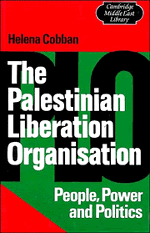Book contents
- Frontmatter
- Contents
- List of illustrations
- Preface
- Abbreviations
- Map 1 Palestine and the surrounding areas
- Introduction
- Part I History of the PLO mainstream
- Part II Internal relations
- PART III External relations
- 9 Arab relations
- 10 International relations
- Conclusions
- Appendixes
- Notes
- References and select bibliography
- Frontmatter
- Contents
- List of illustrations
- Preface
- Abbreviations
- Map 1 Palestine and the surrounding areas
- Introduction
- Part I History of the PLO mainstream
- Part II Internal relations
- PART III External relations
- 9 Arab relations
- 10 International relations
- Conclusions
- Appendixes
- Notes
- References and select bibliography
Summary
From the very start of their association with each other, Fateh's leaders had explicitly rejected any idea of espousing a pan-Arabist ideology, or any other ‘universalist’ ideology. Yet from the earliest days of its emergence the Palestinian resistance movement's development was intricately, even symbiotically, bound up with the course of events in the Arab states. There were many reasons, both objective and subjective, for this. First, following the Palestinian disaster of 1948, the Palestinian nationalists were unable to operate from any ‘liberated area’ inside their own country. Those parts of Mandate Palestine which remained free of Israeli control between 1948 and 1967 were kept under tight control by the Jordanians and the Egyptians throughout that period. The Palestinian refugees who dreamt of Return therefore always had to work for its realisation from under the watchful eye of an Arab government (until 1967, that is, when the refugees in camps in the West Bank and Gaza came under direct Israeli rule). The Arab governments, meanwhile, and especially those in the four Arab countries bordering directly on Israel which were host to the greatest numbers of refugees, have always had their own compelling raisons d'etat to consider when addressing the question of Israel, and thus also the Palestinians’ aims towards Israel.
In addition, the ‘Palestinian question’ was always a vibrant factor in the internal politics of the Arab states. Once again, this factor was especially important in the four states directly bordering Israel, although it was also a factor of undoubted importance in the internal politics of all those other countries which consider themselves Arab, ‘from the [Atlantic] Ocean to the Gulf, as the Arab nationalists described their territory.
- Type
- Chapter
- Information
- The Palestinian Liberation OrganisationPeople, Power and Politics, pp. 195 - 214Publisher: Cambridge University PressPrint publication year: 1984



